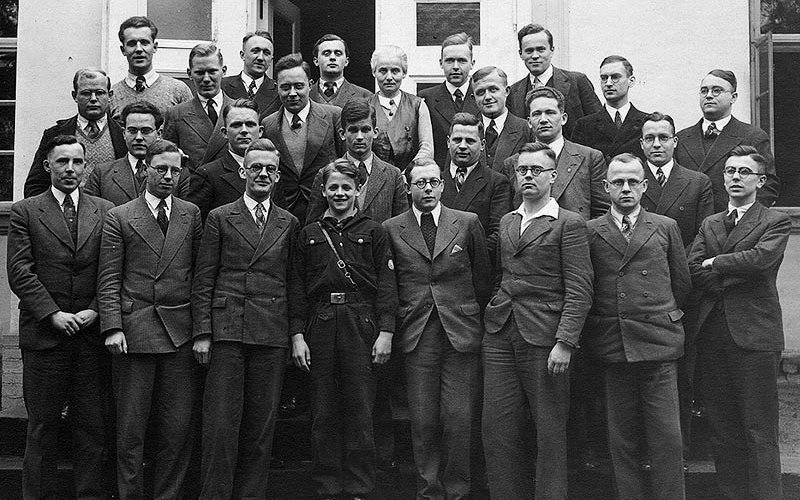
Isaiah Colton Thompson, a senior with a double major in religious studies and history at Cal State Fullerton, discovered his primary subject, Dietrich Bonhoeffer, in a most unusual way … courtesy of a trashcan and an engaging professor. (Bonhoeffer was a German evangelical pastor, theologian and anti-Nazi dissident. His influential writings focused on Christianity’s role in a secular society.)
“I was meeting with one of my professors, Bradley Starr, to discuss my broad research interests,” he recalled. “When I mentioned Bonhoeffer, his eyes lit up. He literally reached into his trashcan and handed me a magazine that was advertising a recently published work on Bonhoeffer. I ordered the book, found an area of interest and the rest, as they say, is history.”
Thompson was looking forward to visiting Washington, D.C., this spring as his senior thesis on Bonhoeffer and the lessons from Finkenwalde Seminary had been selected for display at the Council on Undergraduate Research’s annual “Posters on the Hill” event, which takes place in the nation’s capital. It was abruptly canceled in light of the novel coronavirus pandemic.
A virtual poster session is scheduled for Tuesday, April 21 at 9 a.m. on Twitter. For more information , visit the Council on Undergraduate Research.
“I was surprised and incredibly pleased that my poster was selected,” Thompson said. “Sixty projects were selected, from across the nation, out of 400 applications. The point of the event is to demonstrate the research being performed in universities across the country and encourage further funding for these programs.”
Thompson’s project was the only one selected from the state of California for this honor.
At CSUF, there are many programs that benefit from federal funding, including the Ronald E. McNair Scholars Program, Sally Casanova Pre-Doctoral Scholar and the Mellon Mays Undergraduate Fellowship, all programs that Thompson is involved in.
“Programs of these kinds are incredibly important as they support low-income, first-generation and underrepresented students who want to complete their degrees in higher education,” he said. “Participating in this event not only would have allowed me to promote my research … but would have enabled me to endorse the very programs that encouraged my research.”
The Problem of Discrimination in Nazi Germany
Thompson was particularly interested in “the lessons from Finkenwalde Seminary.” The focus of the seminary was the problem of racism in Nazi Germany.
“During the 1930s, Hitler called on Nazi-supporting Christians to bring Germany’s churches under the ideals of the Nazi state,” Thompson explained. “This included race. The seminary at Finkenwalde resisted those ideas and taught a counter-narrative to combat targeted discrimination. Bonhoeffer directed the seminary and taught many of the classes.”
Many, including Nazi-supporting Christians, held the people, the land and the leader of Germany in high esteem. They believed Germany was called to a special path of victory and triumph. In pursuit of this path, certain groups of people were targeted because they did not fit “the ideal” that Germans had in mind. Bonhoeffer, however, saw the flaw and addressed it directly in lectures from Finkenwalde.
The Power of Resistance
“Ultimately, the research reveals the power of resistance,” Thompson said. “And it looks at the influence of nationalism on race. Because the Nazis held the ideals of the state in such high regard, they justified sacrificing human beings for those ideals. It also focuses on a deeper issue — the power of ideas.
“Because of my research, I often wonder about the everyday influences that impact my thinking. Where do these ideas come from? Who produces them? Bonhoeffer and the students at Finkenwalde remained cognizant of the ideology of their leaders … and strongly resisted this world view.”
Lessons for Today
Thompson believes that some of the lessons of Bonhoeffer resonate today.
“Bonhoeffer and the students witnessed an ideological pandemic — a destructive, violent and deadly virus. It infected government, the educational system and even religious institutions. At its beginning stages, it targeted the elderly and those with health deficiencies. Sound familiar?
“We are in a time where it is not enough to merely prioritize our health but to encourage — from a safe distance — those in our direct community. The Seminary at Finkenwalde is also remembered for its hope. I hope the next generation can look back at this critical time and see that, amid the chaos, confusion and concern, we stand together, bound together in our immediate communities, and provide hope during a time of mass fear and anxiety. We can beat this virus together.”
Contact: Valerie Orleans, vorleans@fullerton.edu